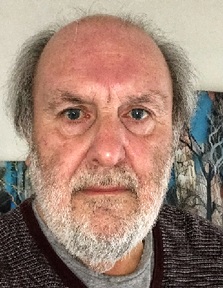How Sheffield artist used alternative therapies in care home to walk again
In January 2018, Sheffield artist Anthony Marshall, was diagnosed with cancer, became wheelchair bound and after being moved to a hospice, thought he was going to die. Over a year on, he has defied all odds by recovering from cancer and learning to walk again, saying “I am now more creative than I have ever been in my life.”

Anthony Marshall, who is in his seventies, has worked and taught as a professional artist and photographer for over 30 years, with his work exhibited in galleries around the UK including Saatchi Art, Tregoning Fine Art and The Barbican. Anthony has undertaken numerous art and design projects with multinational companies, national museums and private art collections including Chatsworth, and RIBA.
'I couldn’t move, I couldn’t even get out of bed'
On being diagnosed with prostate cancer, Anthony told carehome.co.uk: “It pretty much came out of the blue. I was very fit. I had never smoked and didn’t drink, and I walked 25 miles every week. I had done that for many years and then suddenly one day I was walking down the corridor at home when my wife said to me that I was flicking my right foot out as I walked. I was also beginning to stoop a little.
"A few days later, we had been out for lunch in Sheffield and had walked quite a lot, the following day I couldn’t move, I couldn’t even get out of bed.”
They rushed Anthony into hospital where things took a turn for the worse. Anthony had a bladder infection and was moved to a hospice. He said: “They weren’t expecting me to recover so that was really very difficult in a short time. But I did come round and they managed to stabilise the infection.
“Then I underwent a series of MRI scans which confirmed I had cancer and that the cancer had damaged the fifth vertebrae in my spine. Then on 3 January 2018, it was confirmed I had prostate cancer, and my wife Christine became my full-time carer overnight.”
After being diagnosed with cancer, Anthony was prescribed chemotherapy but rejected the treatment, saying: “One of the things that concerned me with chemotherapy was the possibility of debilitating side effects.
“I have been a professional artist for the majority of my life, and there were three books to finish and I wanted to continue to teach and create artworks."
Anthony is a contributor along with Professor Linda Candy to a new book 'The Creative Reflective Practitioner’ being published by Routledge, this spring.

“I then went to see another consultant at Royal Hallamshire Hospital in Sheffield and after some discussion, he offered me hormone therapy treatment.
"I was very fortunate that this treatment stabilised my cancer. My PSA was up around 200 when I was first diagnosed and now it is down to four so the treatment in my case certainly works and has allowed me to continue to work creatively." he says.
The PSA test is a blood test that measures the amount of prostate-specific antigen (PSA) in your blood. PSA is a protein produced by normal cells in the prostate and by prostate cancer cells.
When describing how hormone therapy is administered, Anthony says: “You get an injection in your stomach, which sounds awful, but it isn’t and only takes a few seconds to do and you do it once every three months and if all goes to plan, that treatment actually stabilises your cancer and holds it at bay.”
According to the NHS website, hormone therapy is a treatment that uses medicines to block or lower the amount of hormones in the body to slow down or stop the growth of cancer. Hormone therapy stops hormones being made or prevents hormones from making cancer cells grow and divide. It does not work for all cancers.
'I wanted to keep my brain active'
Anthony moved to Broomcroft House care home in Sheffield in June for rehabilitation.
On entering the care home, staff spoke to Anthony about taking pain relief. “I immediately said why would you want to put me on any drug regime? I’m getting hormone therapy, I don’t need anything else. I wanted to keep my brain active."

During his time in the care home, Anthony worked on a new art technique he has been developing over the last few years on an iPad. “The benefit of working on an iPad is that I could work in bed. I have a large archive of imagery of drawings, paintings and photo images and I bring them all together on the iPad then blend them together into one hybrid piece of artwork. I could do this in bed even though at that stage I couldn’t walk,” he says.
“I then asked the staff if I could see a physio as at that time I wanted to get up and walk. The physio came along and within 10 minutes I was stood up having not walked for five months. Within a couple of months, I was able to walk pushing my wheelchair and then get out of bed on my own and walk with a walker.”
As part of Anthony’s recovery, one of the carers suggested he attended weekly Tai Chi classes which have been proven beneficial in improving both physical and mental aptitude.
Anthony says: “The most interesting thing with Tai Chi that I never thought of was the importance of the breathing exercises. It’s a very elegant way to exercise and you are meant to breathe with each of the movements of the exercise. At first, you find yourself not doing that but once you get into it, the breathing was very beneficial to me because when you’ve been laid in bed your lung capacity drops quite dramatically so the breathing can help with that.
'All our staff here have been inspired by Anthony’s recovery and his positive mindset throughout'
“After a few weeks I started to walk the corridors pushing the wheelchair from the back, then after a few weeks I could walk with crutches, then I could walk with a stick and then eventually free walking. I could then take taxis and go out with my wife with the wheelchair into Sheffield, into the botanicals and do workshops in the botanicals.”
Anthony was discharged from Broomcroft House in February this year. “I now live at home and I can now walk free. I have even joined my local gym to build up my core strength.”
Paul Wright, interim home manager at Bupa Broomcroft House, who has overseen the aiding of Anthony’s rehabilitation, said: “All our staff here have been inspired by Anthony’s recovery and his positive mindset throughout. Tony was determined to walk again and it’s a great feeling to know we’ve helped make this happen.”
click here for more details or to contact Broomcroft House Care Home
Latest Features News
 25-Nov-19
2019 Election: Boris Johnson leaves social care in 'too difficult box' but Labour vows to end 'crisis'
25-Nov-19
2019 Election: Boris Johnson leaves social care in 'too difficult box' but Labour vows to end 'crisis'
 18-Oct-19
Podcast: Wendy Mitchell and dementia: 'My biggest fear is not knowing who my daughters are'
18-Oct-19
Podcast: Wendy Mitchell and dementia: 'My biggest fear is not knowing who my daughters are'
 27-Sep-19
Exclusive: Care minister backs care workers' call for time off to grieve and attend funerals
27-Sep-19
Exclusive: Care minister backs care workers' call for time off to grieve and attend funerals
 19-Sep-19
Podcast: Gyles Brandreth says poetry helps ward off dementia
19-Sep-19
Podcast: Gyles Brandreth says poetry helps ward off dementia
 30-Aug-19
Edinburgh Fringe funnyman joins comics facing toughest audience at care home gig
30-Aug-19
Edinburgh Fringe funnyman joins comics facing toughest audience at care home gig